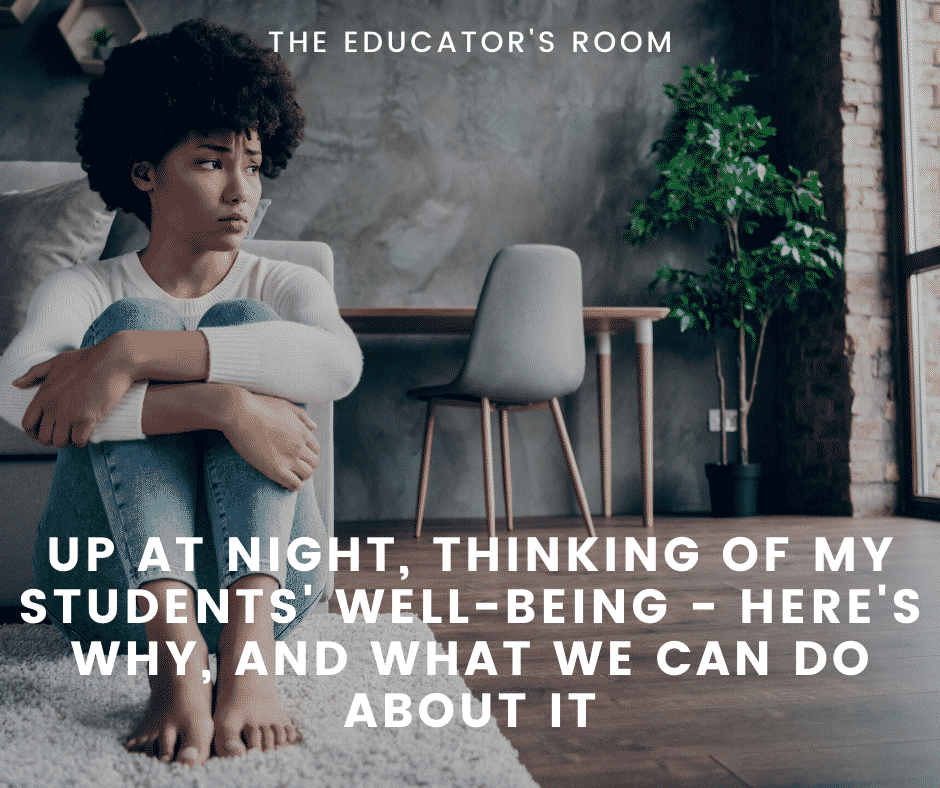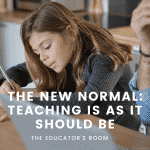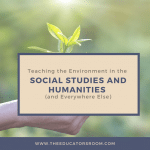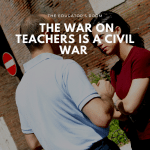I have a confession to make: since school doors have closed and education has moved online, I have slept terribly. Insomnia arouses my slumber around 2 or 3 a.m., and I tend to look at the ceiling for an hour before trodding downstairs for my first cup of coffee.
What’s cajoling this 8th-grade teacher into this zombie state? It’s not teaching, technology, or my 2 toddlers.
It’s the students across our nation who are currently at home.
I think about them because I think about my 14-year-old self. This outbreak would have been a tragedy for me. You see, that’s when I faced plenty of strife at home, as my father was out of the picture and my mother struggled to provide for us on her own. I completely changed my friend group and became involved in drugs and daily mischief. This spilled over into school, where I played patty-cake with trouble, maximizing the days I could be suspended by December. And there were plenty of people who could – and did – give up on me.
But I still loved school, because it was a haven. It was my lifeline. And for kids like me, that sense of well-being is on an indeterminate hiatus.
The backdrop for America’s parents doesn’t look pretty. Consider the following:
- There are serious health concerns – people who are or know those at high risk have completely changed their lifestyles, impacting work, family, and well-being. Worst yet is for those who contract or know those who contract this growing COVID-19 virus.
- No high-fives, handshakes, or hugs – we’re social beings, and just everyday contact we took for granted has now been suspended. People are starting to feel lonely. That has an impact.
- Balancing the employee vs. stay-at-home parent – as Joe Welch, 2019 Pennsylvania Teacher of the Year, noted in his article, trying to work from home with the constant comments from children is exhausting. Parents all across the nation are currently experiencing the difficulty of ensuring their kids are learning while also being productive
- 20% of some states’ workers are now unemployed – Pennsylvania’s job market has changed much more quickly than those in other states; and though there’s an argument for a rapid turnaround once the clouds of Coronavirus clear, it’s far from certain. The only certain thing is that the loss of jobs tends to impact blue-collar, working-class folks at a much higher rate
- Pay and salary cut – those who have kept their jobs have almost certainly been asked to take a pay cut, or soon will be asked of such. Despite this, some folks are working now as hard as ever.
- Lack of savings – the Motley Fool proclaimed last year that 45% of Americans have nothing in their savings account, so the pain is felt hardest by those who are probably the most impacted.
- Worst drop-offs in business since 1946 – the Federal Reserve and Commerce department shared these dropoff statistics earlier in the week, which note unprecedented declines in factories and mines (5.4%), manufacturing (6.3%), general retail (8.7%), restaurants and bars (27%), automobiles (28%) and their sales (25%), and clothing store sales (50%). Small business owners have a right to be concerned.
- Small business pain – for our parents and friends who’ve decided to be their bosses, the struggle is real. Wall Street Journal reports that the small business loan program has already depleted its $350 billion, while The Street estimates that ½ of all small businesses could go under by June.
- More pain to come – the notion that there’s no light at the end of the tunnel paints a grim picture for parents, and as I noted in an article for The Educator’s Room, the pain for schools won’t emerge for a bit, but it will come.
- Stress increased – with all this negativity in play, parents are probably stressed more now than they’ve ever been
Our students are facing unprecedented stressors as well, such as:
- Loss of contact with friends + family – one of my friends told me how they shared an Easter moment with a loved one through a glass door; she and her kids stayed inside while her parents stayed outside. They left the kids basket for several hours before bringing it inside. This hurts my heart. In a similar vein, constant TikToks between teens cannot replace sitting and talking with a friend at lunch or working side-by-side on a project.
- Interactions with teachers – kids love talking with the teachers in the hallway or just connecting with them on a personal, mentor-like level, and even the kids who used to profess to “hating school” or their teachers certainly do miss it.
- Extracurriculars that build character – the things that kids love the most – what they choose to do with their time after school – is gone. Certainly they can train (I’ve enjoyed watching 2 of my neighbors shoot hoops with sincere dedication), but for another neighbor who was set to be senior captain of his volleyball team, that’s gone. And that’s depressing.
- Support services in and out of school are curtailed – most alarming is the support that students would usually receive have been disrupted, cut, or redefined, such as guaranteed lunches, occupational therapy, speech therapy, counseling, and special ed
- Not reporting abuse for fear of retribution – As the Penn Capital-Star shared, Pennsylvania’s child abuse hotline is now receiving fewer calls than it had been in the months leading up to the outbreak. A similar deafness is probably heard in other states. While one can hope that’s because things are getting better, it’s probably because students who are being abused fear that “snitching” could lead to further abuse.
- This could impact our school’s commencement in the fall – we could plead ignorance and assume things will be normal once the summer should bake out the flu season, but when it re-emerges in October, what then? What if it lingers before? Pennsylvania’s Secretary of Education Pedro Rivera noted on an edition of Smart Talk that the state is making plans for this possible contingency.
- People minimizing students’ problems – one of my former students took to social media to tell everyone that though his disrupted college life might not seem all that chaotic, he has the right to feel the way he wants to feel; adults don’t have the right to minimize kids problems just because they have experienced worse. For some kids, this might be the most painful part of their life, ever.
So, after being whapped over the head with all this negativity (apologies), here’s how a teacher can truly help their students:
- Take care of yourself and your family first – there’s no doubt one’s strength to do something at all must begin within. First, take care of yourself, teachers, and make sure you’re getting that sleep you’ve been missing. As the analogy goes: you can’t save others on a diving plane if you don’t put your face mask on first.
- Buildings might be closed, but schools are not – despite how the media is portraying this, schools are NOT closed, and many educators are working harder now than they ever have, not just at juggling life but being there for students online.
- Remind yourself kids didn’t sign up for this – one of my former students took to social media to rant about how much he can’t stand school now, and he just wants the classes and the people he signed up for. When things like this happen, don’t take it personally. Instead, get underneath the student’s visceral views and help them navigate it.
- Create a routine – there’s no doubt the 2-week (out)break beginning on Friday, March 13th has disrupted kids’ routines, with many professing to sleep from 4 a.m. to Noon. If you can help them build their schedule, or even make a mock one for them, that consistency will help them — and you.
- Let kids see your face – I’m reminded that of the 140+ students I teach, there’s bound to be one who my colleagues and I tell him/her that they matter, that they are cared for, and who smile in their direction. A smile can warm a heart in many ways, as can laughter. Get on Zoom or whatever your district is using and just have bonding time with students.
- Talk about things OTHER than school – any teacher would tell you that some of the best lessons they’ve ever shared with kids did not appear in the State Standards. Please don’t forget that during online learning or ever.
- Bridge problems with fun – I’m no PE teacher, but I still created this Marvel High-Intensity Interval Training (HIIT) if only to workout at home by including my own 2- and 4-year-old kids. Not only do they love it, my 8th-graders do, too.
- Protect instead of project – with all the time online and to think, many of us are projecting ourselves onto others. Whether it’s someone complaining and we remind them that “others have it worse than you,” an elected official who should’ve acted in a certain way, or a kid who is blowing-off our lessons, we shouldn’t be so quick to project how we think they should act or feel; instead, we should give them safe harbor to grow.
- Challenge kids to do their best – that said, we wish to provide the best darn education we can for our students, ensuring there’s no “blip” in the radar or “chink” in the armor from this year for our students and their educational futures.
- Operate with grace – this is the word that I’ve been using the most. We need to step back and realize that things are going and will go wrong. More than ever, a sense of understanding and belief in “doing what’s right” never was louder.
- Realize “no man’s an island” – you might feel alone as if the classroom door is never open to talking with others, but channel your inner-John Donne and remember are fantastic ways to get involved with your staff (I’m hosting a digital happy hour this week) as well as wonderful professional development from various organizations, not least of which is our own PA Teachers Advisory Committee’s Professional Learning Communities for elementary, middle school, and high school settings. Let’s do this all together.
In the end, there’s no doubt that COVID-19 will change education more than just about anything else in our lifetimes. But it doesn’t have to change the nature or character of the teacher, let alone his/her sleep schedule. May you find a refined sense of purpose and mission amidst all of this rancor.






